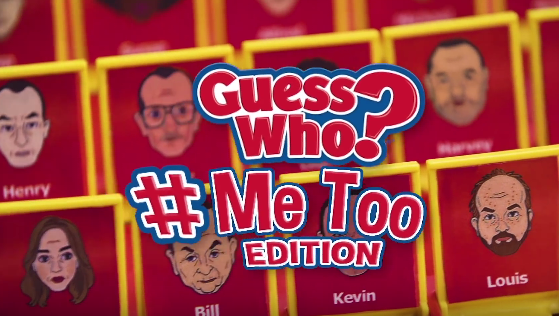Guess Who?: #MeToo Edition

Sexual harassment is no laughing matter, but a recent Funny or Die sketch has managed to add some humor (dark though it may be) to the plague of sexual misconduct that spawned the #MeToo movement. The sketch, which was released on February 26, stars Evan Rachel Wood (Westworld) and Kelly Marie Tran (Star Wars: The Last Jedi). The two are playing a version of the classic board game Guess Who?, updated for a more modern, seedier era.
This version of Guess Who — called Guess Who: #MeToo Edition — includes boards that are identical to those that come with the original family-friendly board game: rows of caricatures of faces. But instead of random people, the cards in this version depict the faces of notorious accused sexual predators, including Louis C.K., Bill Cosby, Harvey Weinstein, Terry Richardson, Matt Lauer, and others. An expansion pack that updates every ten hours to keep up with the inexhaustible list of predators being outed is also available.
Not only are the characters in this game different than the original, but instead of trying to guess physical features, the players in this version of the game describe sexual assault allegations in order to deduce which specific predator the opponent has chosen and wipe other possible identities off the board. For example, one player takes aim at Mario Batali for including a cinnamon roll recipe in his public apology. Another references Bill O’Reilly’s “planned vacation,” which happened to coincide with accusations of sexual misconduct directed at him.
A jingle plays in the background — cheery in tone, yet ominous in terms of its lyrics, like “Guess who, guess who, cooks do it too,” and “If things don’t change they could get you too.” At the end of the game, a third woman asks if she can join Wood and Tran’s game, to which Tran responds, “Of course, you don’t have a choice.”
The satire is as much of a treatise on the magnitude of sexual assault allegations as it is a magnification of specific, parallel instances of abuse. While the parody game may target celebrities, the parody commercial sends an overall message about abuse that extends far beyond the accusations that have infested Hollywood. It points to the universality of harassment — the culture that allows romantic, platonic, and/or work relationships to foster abuses of trust and power that have gone unchecked for decades. It also acknowledges that this plague of violence has persisted due to a foundation of jokes: of double entendres, euphemisms, and a llaissez-faire attitude toward abusers (“boys will be boys!”). Abuse is a ubiquitous force, this commercial recognizes, and victims don’t get to chose whether or not they get to be part of what their abusers may consider their own game.
The video finishes with a somber, sobering call to action: It instructs viewers who want to get involved with stopping abuse to support an initiative called Rise, which is a program dedicated to bringing justice to survivors of sexual assault and misconduct. The video’s change in tone is jarring. It comes abruptly, with no warning or respite from the levity that preceded it. But this change is necessary. It acts as a kind of metacommentary on the current climate of sexual harassment: At some point it needs to be taken gravely seriously. There is nowhere else for the viewer to turn to claim that they’re still oblivious to the problem at hand. The only thing to do now is acknowledge the facts of misconduct and support efforts to stem the tide.
More articles by Category: Arts and culture, Media
More articles by Tag: Sexualized violence, Sexual harassment, #MeToo


























